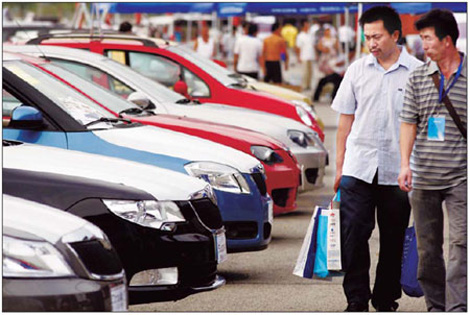Cars
Sun still shines on EU carmakers
Updated: 2011-06-10 10:26
By Wang Chao (China Daily European Weekly)
 |
|
Cars at an auto market in Zhengzhou, Henan province. China's auto market continued to slow down in May. Sha Lang / for China Daily |
VW, Mercedes buck sluggish auto trend with better sales
Rising oil prices, sluggish demand and withdrawal of tax breaks for small engine vehicles continued to weigh heavily on the auto market in China during May with sales dipping for a second month in row.
But the silver lining amid the gloom in May has been the remarkable resilience of some European carmakers as they not only withstood the battering, but also managed to boost sales.
Car sales declined by 8.71 percent in May to 1.04 million units compared with April, figures released by the China Association of Automotive Manufacturers (CAAM) show.
The Chinese car market had been on a steady growth path till April when it encountered its first speed bumps as sales slumped and companies started cutting output. That trend seems to have continued into last month with CAAM figures indicating that production volumes dropped by 10 percent in May to 1.04 million units.
Dong Yang, vice-chairman of CAAM, however, does not sound perturbed and remarks that the sluggish market trend was on the cards as there were several negative triggers in the last two months.
"With the government doing away with the favorable tax policies and incentives for minivans, demand has dwindled," Dong says.
Yet another factor that has crimped demand is the supply constraints being faced by Japanese automakers like Toyota and Honda. Many Chinese original equipment manufacturers for these Japanese companies have also been hit, as they are yet to get the key components from Japan.
"Against such a backdrop, the Chinese automobile market may have some difficulty in maintaining its expectations of 10 to 15 percent year-on-year growth this year," Dong says.
Shen Jinjun, secretary-general of China Automobile Dealers Association, feels that rising oil prices have hit customer sentiment. With the government contemplating a further crackdown on misuse of official cars, the demand factor seems to be at its lowest ebb, he says.
The world's third-largest automaker and top European brand Volkswagen AG continued to be on a strong perch in China as it and its sister brand Audi ratcheted up impressive sales numbers. Mercedes-Benz was another European carmaker that defied the May slump in China.
Richard Wang, marketing manager of China Automobile Trading Co Ltd, a leading auto import and export company, says that European cars enjoyed better fortunes as they could ensure a steady supply of spare parts from Europe.
"Domestic automakers rely heavily on spare parts from Japan, and many of them cut production after the tsunami. European companies, however, did not have any such problems," he says.
Volkswagen sold 88,008 units last month in China, with a year-on-year growth of 18.1 percent. During the first five months of this year, Volkswagen has achieved accumulated sales of 438,396 units, up 16.9 percent year-on-year.
Mercedes-Benz sold 16,401 vehicles in China during May, clocking a higher growth rate 43.1 percent year-on-year.
Volkswagen's Audi continued to lead the luxury car segment, with sales of 25,200 cars in May, a year-on-year increase of 44.6 percent.
"Soaring oil prices and higher parking charges have little impact on luxury car sales, as rich people do not bother too much about such factors," Wang says. "That's why high-end and luxury cars sold so well in May."
Unlike their European counterparts, the US car brands did not buck the trend. General Motors reported a 2.7 percent year-on-year decline in China car sales to 190,674 units during May.
But the Chinese market is seen crucial to GM's fortunes. Since 2009, the Chinese auto market has overtaken the US to become the largest market for GM. To better explore this market, GM has also moved its global marketing center to China.
Despite the slump, GM says it is still "satisfied with its performance in China during the first five months of the year". In the five months of 2011, GM sold 1.1 million cars, a new record.
Compared with GM, another major US auto company, Ford, has lagged far behind. In May, Ford sold only 45,162 cars, less than one-quarter of GM's.
Alan Mulally, president and CEO of Ford, predicts that the production capacity of Ford will reach 1.1 million units by 2012, and by 2020 one-third of sales will come from the emerging markets in Asia driven by huge demands in these areas.

Specials

My China story
Foreign readers are invited to share your China stories.

Pret-a-design
Though Elisabeth Koch did not attend the Aprilweddingof Prince William and Kate Middleton in London, her tailor-made hats might have.

Mom’s the word
Italian expat struggles with learning English and experiences the joys of motherhood again.